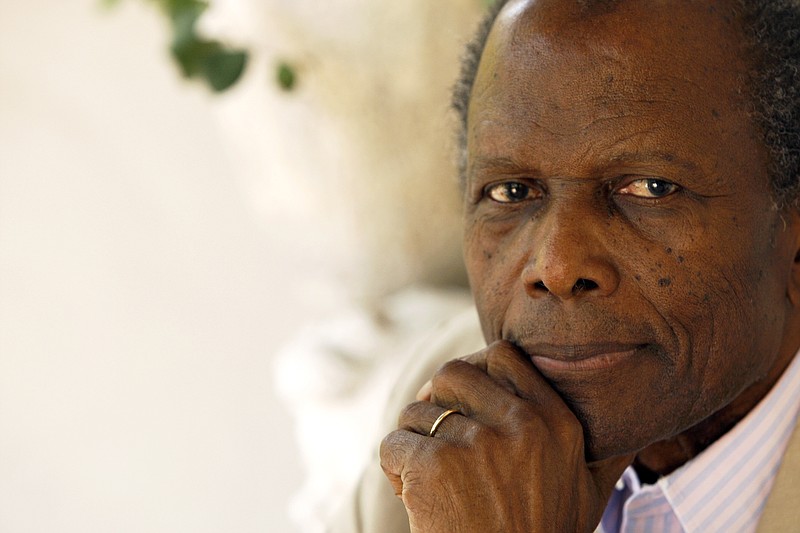NEW YORK (AP) -- Sidney Poitier, who played roles of such dignity and intelligence that he transformed how Black people were portrayed on screen, becoming along the way the first Black actor to win an Oscar for best lead performance and the first to be a top box-office draw, has died. He was 94.
Poitier, winner of the best actor Oscar in 1964 for "Lilies of the Field," died Thursday at his home in Los Angeles, said Latrae Rahming, the director of communications for the Prime Minister of Bahamas. His close friend and great contemporary Harry Belafonte issued a statement Friday, remembering their extraordinary times together.
"For over 80 years, Sidney and I laughed, cried and made as much mischief as we could," he wrote. "He was truly my brother and partner in trying to make this world a little better. He certainly made mine a whole lot better."
Few movie stars, Black or white, had such an influence both on and off the screen. Before Poitier, no Black actor had a sustained career as a lead performer and rarely was one permitted a break from the stereotypes of bug-eyed servants and grinning entertainers.
Poitier, the son of Bahaman tomato farmers, appeared in more than 25 films during the 1950s and '60s and his rise paralleled the growth of the civil rights movement. As racial attitudes evolved and segregation laws were challenged and fell, Poitier was the performer to whom a cautious Hollywood turned for stories of progress.
He was the escaped Black convict who befriends a racist white prisoner (Tony Curtis) in "The Defiant Ones." He was the courtly office worker who falls in love with a blind white girl in "A Patch of Blue." He was the handyman in "Lilies of the Field" who builds a church for a group of nuns.
With his handsome, flawless face, intense stare and disciplined style, Poitier was for years not just the most popular Black movie star, but the only one.
"I made films when the only other Black on the lot was the shoeshine boy," he recalled in a 1988 Newsweek interview. "I was kind of the lone guy in town."
Poitier peaked in 1967 with three of the year's most notable movies: "To Sir, With Love," in which he starred as a school teacher who wins over his unruly students at a London secondary school; "In the Heat of the Night," as the determined police detective Virgil Tibbs; and in "Guess Who's Coming to Dinner," as the prominent doctor who wishes to marry a young white woman he only recently met, her parents played by Spencer Tracy and Katharine Hepburn in their final film together.
His unique appeal brought him the same burdens as other pioneers such as Jackie Robinson and the Rev. Martin Luther King Jr. He was subjected to bigotry from whites and accusations of compromise from the Black community. Poitier was held, and held himself, to standards well above his white peers. He refused to play villains or cads and took on characters, especially in "Guess Who's Coming to Dinner," of almost divine goodness. He developed an even, but resolved and occasionally humorous persona crystallized in his most famous line -- "They call me Mr. Tibbs!" -- from "In the Heat of the Night."
But even in his prime he was criticized for being out of touch. He was called an Uncle Tom and a "million-dollar shoeshine boy." In 1967, the New York Times published Black playwright Clifford Mason's essay, "Why Does White America Love Sidney Poitier So?" Mason dismissed Poitier's films as "a schizophrenic flight from historical fact" and the actor as a pawn for the "white man's sense of what's wrong with the world."
Stardom didn't shield Poitier from racism or condescension. He had a hard time finding housing in Los Angeles and was followed by the Ku Klux Klan when he visited Mississippi in 1964, not long after three civil rights workers had been murdered there. In interviews, journalists often ignored his work and asked him instead about race and current events.
"I am an artist, man, American, contemporary," he snapped during a 1967 press conference. "I am an awful lot of things, so I wish you would pay me the respect due."
Poitier was not as engaged politically as his friend and contemporary Belafonte, but he participated in the 1963 March on Washington and other civil rights events, and as an actor defended himself and risked his career. He refused to sign loyalty oaths during the '50s, when Hollywood was blacklisting suspected Communists, and turned down roles he found offensive.
"Almost all the job opportunities were reflective of the stereotypical perception of Blacks that had infected the whole consciousness of the country," he recalled. "I came with an inability to do those things. It just wasn't in me. I had chosen to use my work as a reflection of my values."
 REMOVES REFERENCE TO THE BAHAMAS - FILE - President Barack Obama presents the 2009 Presidential Medal of Freedom to Sidney Poitier during ceremonies in the East Room at the White House in Washington on, Aug. 12, 2009. Poitier, the groundbreaking actor and enduring inspiration who transformed how Black people were portrayed on screen, became the first Black actor to win an Academy Award for best lead performance and the first to be a top box-office draw, died Thursday, Jan. 6, 2022. He was 94. (AP Photo/J. Scott Applewhite, File)
REMOVES REFERENCE TO THE BAHAMAS - FILE - President Barack Obama presents the 2009 Presidential Medal of Freedom to Sidney Poitier during ceremonies in the East Room at the White House in Washington on, Aug. 12, 2009. Poitier, the groundbreaking actor and enduring inspiration who transformed how Black people were portrayed on screen, became the first Black actor to win an Academy Award for best lead performance and the first to be a top box-office draw, died Thursday, Jan. 6, 2022. He was 94. (AP Photo/J. Scott Applewhite, File)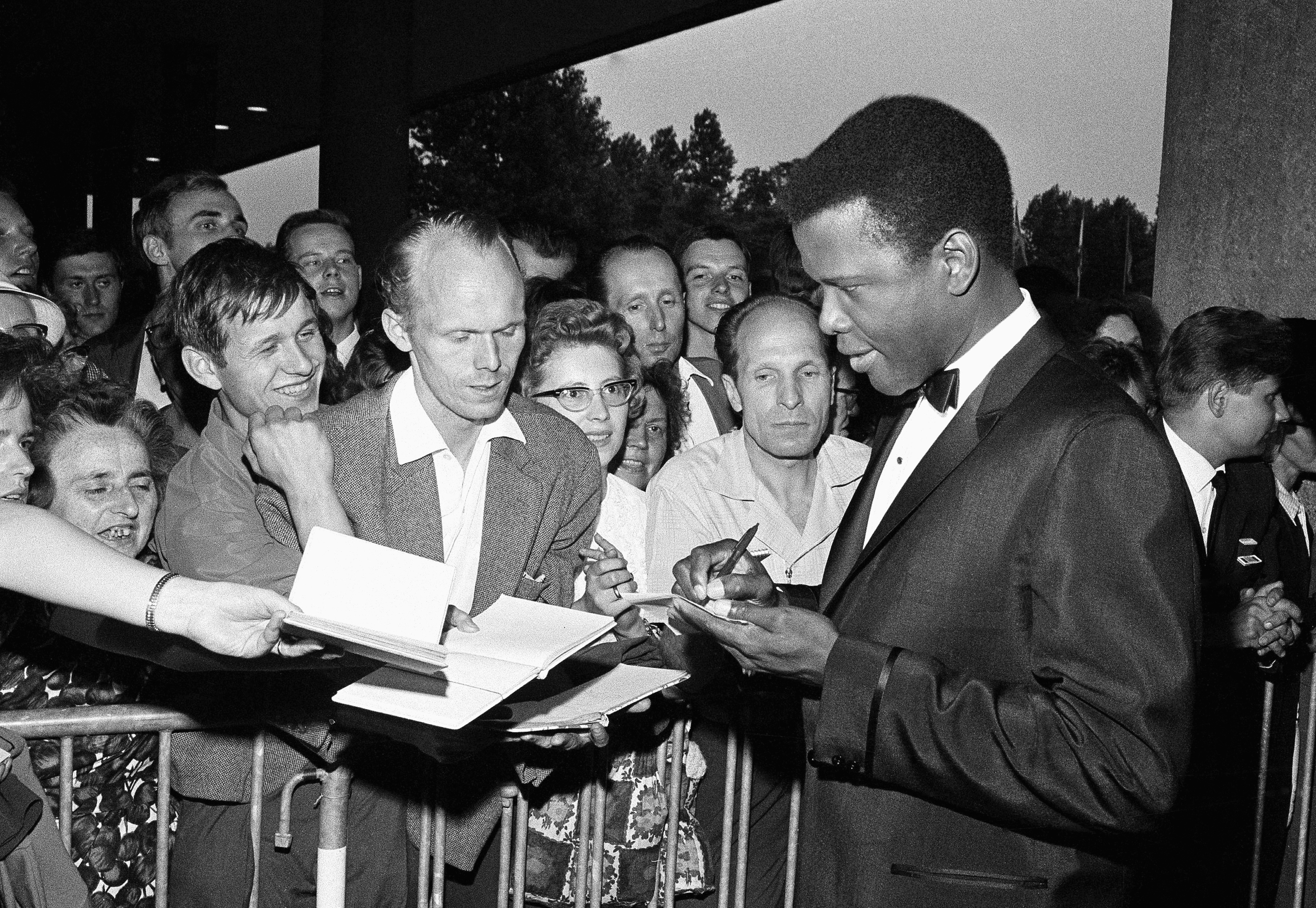 REMOVES REFERENCE TO THE BAHAMAS -FILE - Sidney Poitier signs autographs before the opening of the 14th International Film Festival at the West Berlin congress hall on June 26, 1964 in Berlin. Poitier, the groundbreaking actor and enduring inspiration who transformed how Black people were portrayed on screen, became the first Black actor to win an Academy Award for best lead performance and the first to be a top box-office draw, died Thursday, Jan. 6, 2022. He was 94. (AP Photo/Edwin Reichert, File)
REMOVES REFERENCE TO THE BAHAMAS -FILE - Sidney Poitier signs autographs before the opening of the 14th International Film Festival at the West Berlin congress hall on June 26, 1964 in Berlin. Poitier, the groundbreaking actor and enduring inspiration who transformed how Black people were portrayed on screen, became the first Black actor to win an Academy Award for best lead performance and the first to be a top box-office draw, died Thursday, Jan. 6, 2022. He was 94. (AP Photo/Edwin Reichert, File)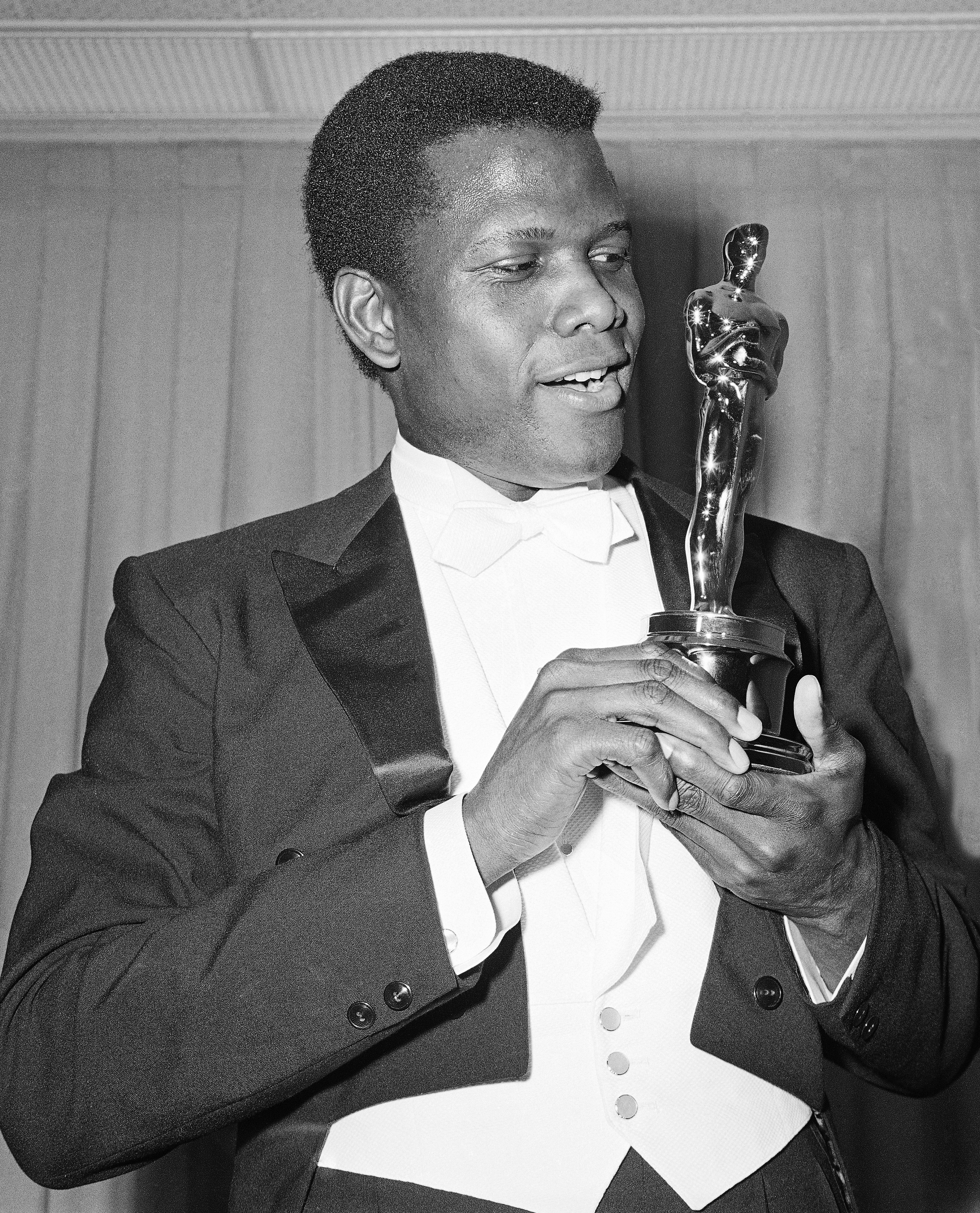 REMOVES REFERENCE TO THE BAHAMAS - FILE - Actor Sidney Poitier poses with his Oscar for best actor for "Lillies of the Field" at the 36th Annual Academy Awards in Santa Monica, Calif. on April 13, 1964. Poitier, the groundbreaking actor and enduring inspiration who transformed how Black people were portrayed on screen, became the first Black actor to win an Academy Award for best lead performance and the first to be a top box-office draw, died Thursday, Jan. 6, 2022. He was 94. (AP Photo, File)
REMOVES REFERENCE TO THE BAHAMAS - FILE - Actor Sidney Poitier poses with his Oscar for best actor for "Lillies of the Field" at the 36th Annual Academy Awards in Santa Monica, Calif. on April 13, 1964. Poitier, the groundbreaking actor and enduring inspiration who transformed how Black people were portrayed on screen, became the first Black actor to win an Academy Award for best lead performance and the first to be a top box-office draw, died Thursday, Jan. 6, 2022. He was 94. (AP Photo, File) REMOVES REFERENCE TO THE BAHAMAS - FILE - Sidney Poitier poses with his honorary Oscar during the 74th annual Academy Awards on March 24, 2002, in Los Angeles. Poitier, the groundbreaking actor and enduring inspiration who transformed how Black people were portrayed on screen, became the first Black actor to win an Academy Award for best lead performance and the first to be a top box-office draw, died Thursday, Jan. 6, 2022. He was 94. (AP Photo/Doug Mills, File)
REMOVES REFERENCE TO THE BAHAMAS - FILE - Sidney Poitier poses with his honorary Oscar during the 74th annual Academy Awards on March 24, 2002, in Los Angeles. Poitier, the groundbreaking actor and enduring inspiration who transformed how Black people were portrayed on screen, became the first Black actor to win an Academy Award for best lead performance and the first to be a top box-office draw, died Thursday, Jan. 6, 2022. He was 94. (AP Photo/Doug Mills, File)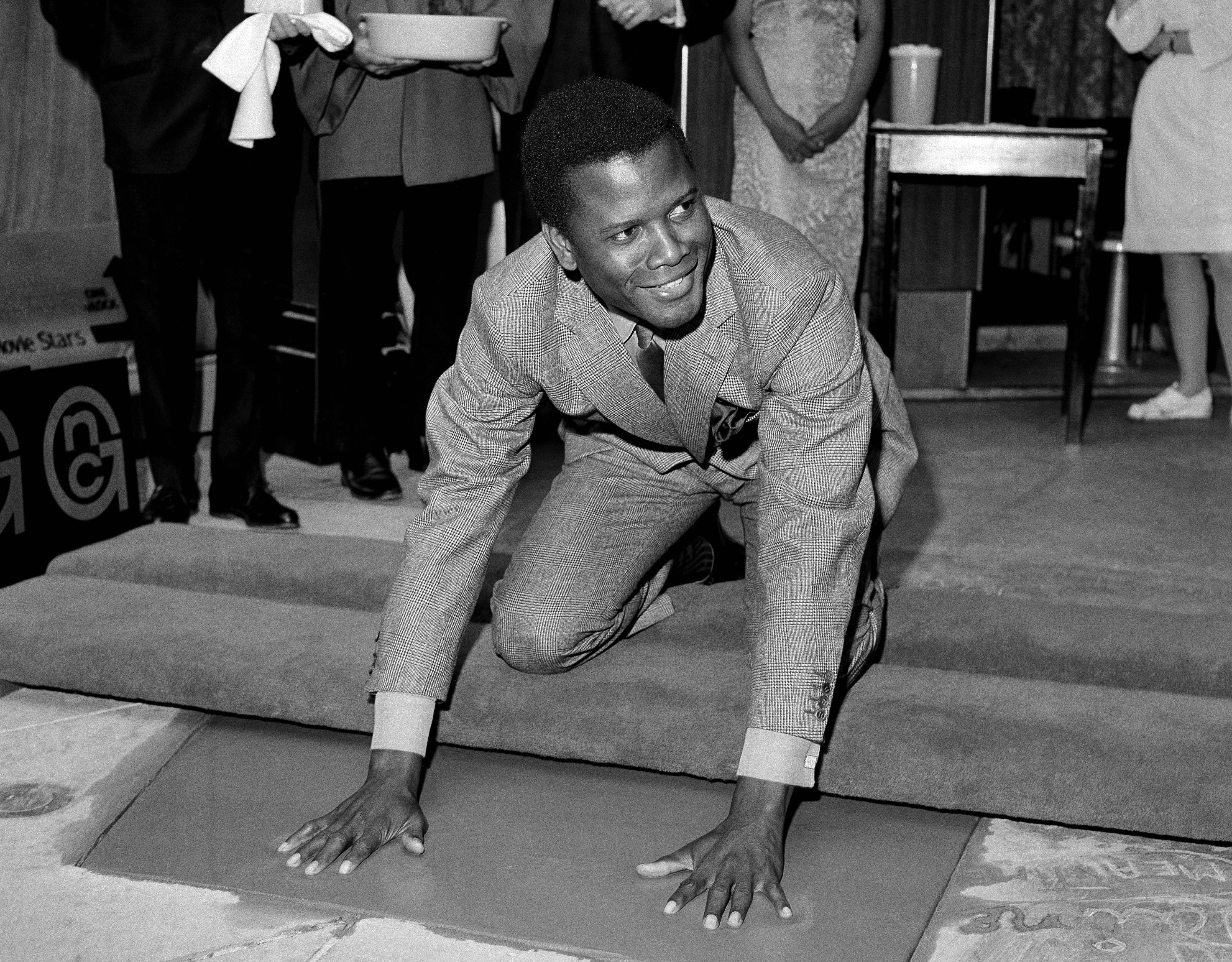 REMOVES REFERENCE TO THE BAHAMAS - FILE - Sidney Poitier, star of "To Sir With Love," places his hands in wet cement at Grauman's Chinese Theater in Los Angeles on June 23, 1967. Poitier, the groundbreaking actor and enduring inspiration who transformed how Black people were portrayed on screen, became the first Black actor to win an Academy Award for best lead performance and the first to be a top box-office draw, died Thursday, Jan. 6, 2022. He was 94. (AP Photo/File)
REMOVES REFERENCE TO THE BAHAMAS - FILE - Sidney Poitier, star of "To Sir With Love," places his hands in wet cement at Grauman's Chinese Theater in Los Angeles on June 23, 1967. Poitier, the groundbreaking actor and enduring inspiration who transformed how Black people were portrayed on screen, became the first Black actor to win an Academy Award for best lead performance and the first to be a top box-office draw, died Thursday, Jan. 6, 2022. He was 94. (AP Photo/File) REMOVES REFERENCE TO THE BAHAMAS - Actor Sidney Poitier's star on the Hollywood Walk of Fame is pictured on Sept. 1, 2020, in Los Angeles. Poitier, the groundbreaking actor and enduring inspiration who transformed how Black people were portrayed on screen, became the first Black actor to win an Academy Award for best lead performance and the first to be a top box-office draw, died Thursday, Jan. 6, 2022. He was 94. (AP Photo/Chris Pizzello, File)
REMOVES REFERENCE TO THE BAHAMAS - Actor Sidney Poitier's star on the Hollywood Walk of Fame is pictured on Sept. 1, 2020, in Los Angeles. Poitier, the groundbreaking actor and enduring inspiration who transformed how Black people were portrayed on screen, became the first Black actor to win an Academy Award for best lead performance and the first to be a top box-office draw, died Thursday, Jan. 6, 2022. He was 94. (AP Photo/Chris Pizzello, File)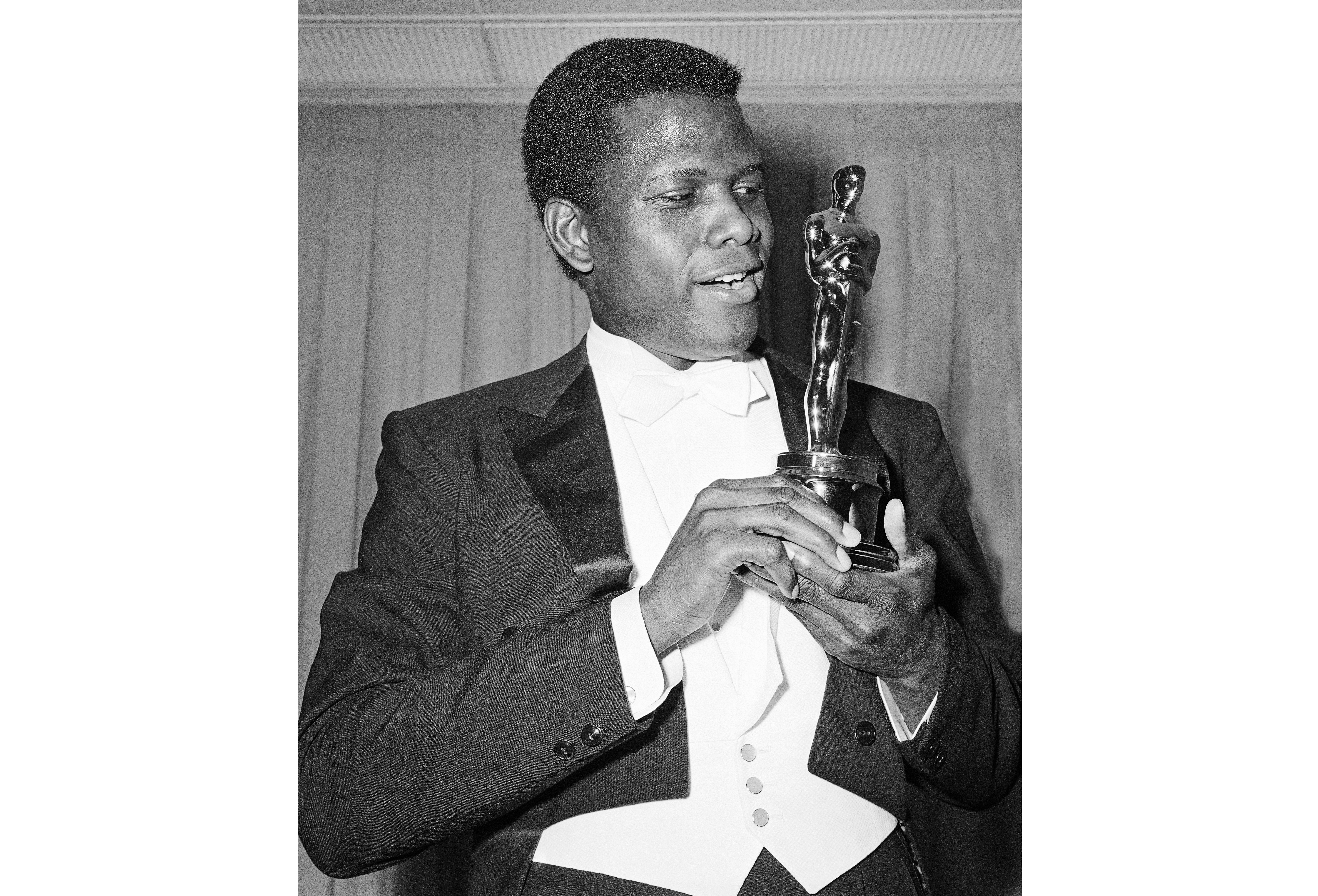 REMOVES REFERENCE TO THE BAHAMAS - FILE - Actor Sidney Poitier poses with his Oscar for best actor for "Lillies of the Field" at the 36th Annual Academy Awards in Santa Monica, Calif. on April 13, 1964. Poitier, the groundbreaking actor and enduring inspiration who transformed how Black people were portrayed on screen, became the first Black actor to win an Academy Award for best lead performance and the first to be a top box-office draw, died Thursday, Jan. 6, 2022. He was 94. (AP Photo, File)
REMOVES REFERENCE TO THE BAHAMAS - FILE - Actor Sidney Poitier poses with his Oscar for best actor for "Lillies of the Field" at the 36th Annual Academy Awards in Santa Monica, Calif. on April 13, 1964. Poitier, the groundbreaking actor and enduring inspiration who transformed how Black people were portrayed on screen, became the first Black actor to win an Academy Award for best lead performance and the first to be a top box-office draw, died Thursday, Jan. 6, 2022. He was 94. (AP Photo, File)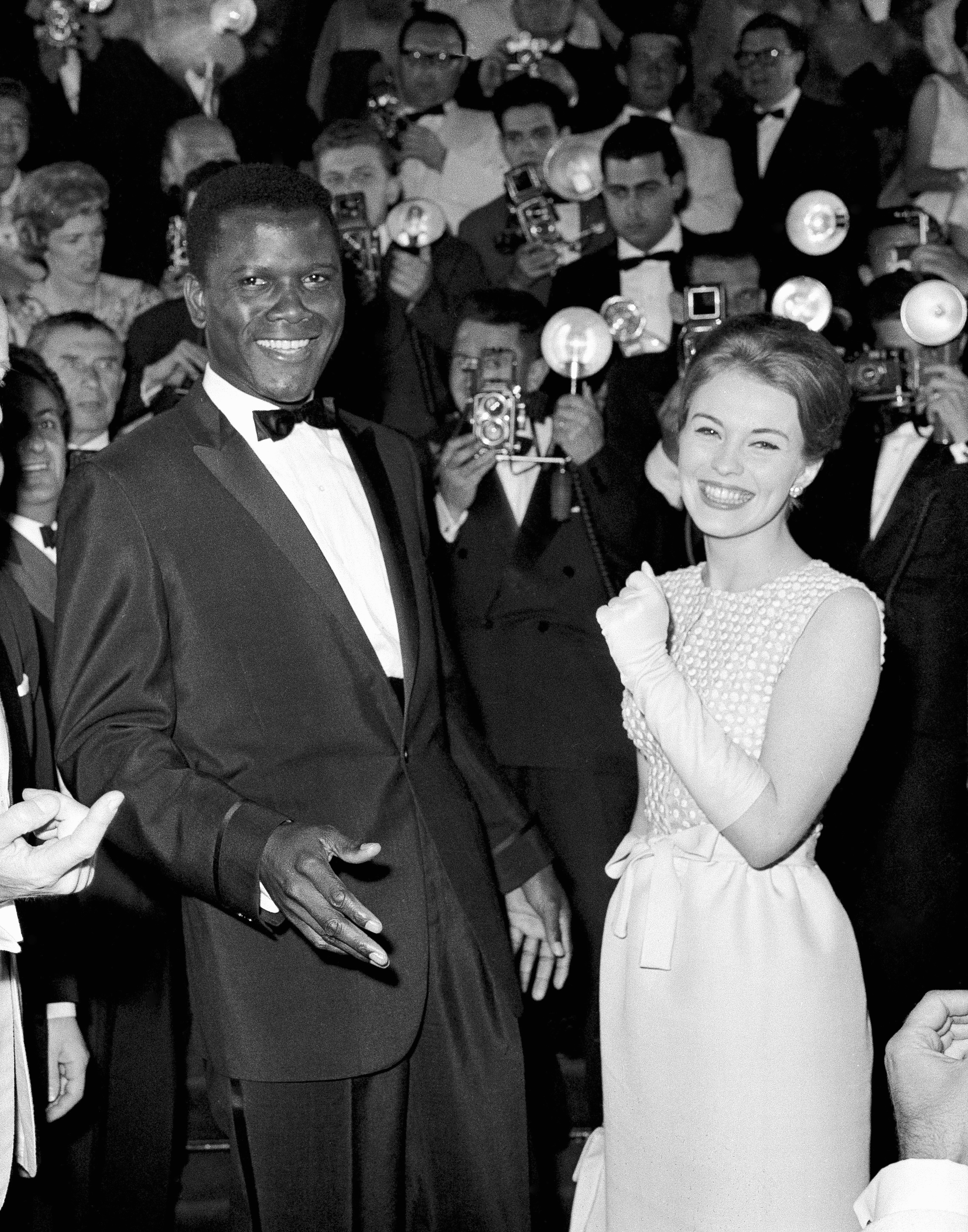 REMOVES REFERENCE TO THE BAHAMAS - FILE - Actors Sidney Poitier, left, and Jean Seberg appear at the Cannes Film Festival, Cannes, France, for the showing of his film "A Raisin in the Sun," on May 13, 1961. Poitier, the groundbreaking actor and enduring inspiration who transformed how Black people were portrayed on screen, became the first Black actor to win an Academy Award for best lead performance and the first to be a top box-office draw, died Thursday, Jan. 6, 2022. He was 94. (AP Photo, File)
REMOVES REFERENCE TO THE BAHAMAS - FILE - Actors Sidney Poitier, left, and Jean Seberg appear at the Cannes Film Festival, Cannes, France, for the showing of his film "A Raisin in the Sun," on May 13, 1961. Poitier, the groundbreaking actor and enduring inspiration who transformed how Black people were portrayed on screen, became the first Black actor to win an Academy Award for best lead performance and the first to be a top box-office draw, died Thursday, Jan. 6, 2022. He was 94. (AP Photo, File)
